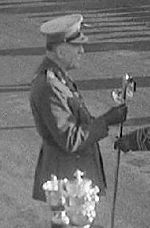- Cyril Deverell
-
Sir Cyril Deverell
Field Marshal Sir Cyril DeverellBorn 9 November 1874
St Peter Port, GuernseyDied 12 May 1947 (aged 72)
Lymington, HampshireAllegiance  United Kingdom
United KingdomService/branch  British Army
British ArmyYears of service 1895 - 1937 Rank Field Marshal Commands held 3rd Division
53rd (Welsh) Division
Western Command
Eastern CommandBattles/wars World War I Awards Knight Grand Cross of the Order of the Bath
Knight Commander of the Order of the British EmpireField Marshal Sir Cyril John Deverell, GCB, KBE, ADC (9 November 1874 - 12 May 1947) was a British career military officer who served as Chief of the Imperial General Staff in 1936 and 1937.
Contents
Army career
Educated at Bedford School he was commissioned into the Prince of Wales's West Yorkshire Regiment in 1895.[1]
Deverell received his first command assignment in 1915 during World War I, when he was asked to command the 20th Brigade, 7th Division.[1] The division was present at the Somme.[1] It held a position on the 21st Division's right flank during the Battle of Bazentin Ridge and attacked the Switch Line to the east of High Wood; one of Deverell's men, Theodore William Henry Veale, won the Victoria Cross during this action.[2] Several weeks later, Deverell was given command of the 3rd Division[1] after its commander, Sir Aylmer Haldane, took over VI Corps.
Deverell formally took command on 7 August 1916. He led the division at Arras in 1917, then participated in the latter stages of Passchendaele. He returned to the Somme in 1918, before fighting alongside the Portuguese at the Battle of the Lys. The division participated in the Hundred Days Offensive, finally leading to the German surrender on 11 November 1918.[3]
He commanded that division until 1919, when he took over command of the 53rd (Welsh) Division.[3] In 1921 he moved to India, where he commanded the United Provinces District, served as Quartermaster-General and finally became Chief of the General Staff of India in 1930.[3] He became Commander-in-Chief of Western Command in 1931 and then Eastern Command in 1933[3] and then served as Aide-de-Camp to King George V before being promoted to field marshal and assuming the position of Chief of the Imperial General Staff on 15 May 1936.[3] He would hold the latter office for 20 months before retiring from active service. He did not serve during World War II.
References
Further reading
- The British Field Marshals 1736-1997, Tony Heathcote, Pen & Sword Books Ltd, 1999, ISBN 0-85052-696-5
External links
Military offices Preceded by
Aylmer HaldaneGeneral Officer Commanding the 3rd Division
1916–1919Succeeded by
Robert WhighamPreceded by
Sir Cecil RomerGOC-in-C Western Command
1931–1933Succeeded by
Sir Walter KirkePreceded by
Sir Webb GillmanGOC-in-C Eastern Command
1933–1936Succeeded by
Sir Edmund IronsidePreceded by
Sir Archibald Montgomery-MassingberdChief of the Imperial General Staff
1936–1937Succeeded by
The Viscount GortCategories:- 1874 births
- 1947 deaths
- British Field Marshals
- British Army World War I generals
- Knights Commander of the Order of the British Empire
- Knights Grand Cross of the Order of the Bath
- Old Bedfordians
- West Yorkshire Regiment officers
- Chiefs of the Imperial General Staff
Wikimedia Foundation. 2010.


